Overview
This article delves into the features, benefits, and evolution of winery POS systems, underscoring their vital role in enhancing operational efficiency and customer engagement within vineyards. By facilitating seamless transactions and improving inventory management, these systems empower wineries to implement targeted marketing strategies effectively. Ultimately, they drive sales growth and foster customer loyalty in an increasingly competitive market.
Consider how these systems can transform your operations: Are you maximizing your transaction efficiency? With the right POS system, you can streamline processes and focus on what truly matters—your customers. The evolution of winery POS systems is not just a trend; it’s a strategic necessity for those looking to thrive in today’s market.
In conclusion, investing in a robust winery POS system is more than just an upgrade; it’s a commitment to operational excellence and customer satisfaction. Embrace this opportunity to elevate your vineyard’s performance and secure a competitive edge.
Introduction
The wine industry is experiencing a profound transformation, as wineries increasingly adopt advanced technology to elevate their operations and enhance customer interactions. At the forefront of this revolution is the winery POS system, which boasts features that streamline sales processes while fostering deeper connections with consumers. Yet, as vineyards embrace these innovative tools, critical questions emerge:
- How can these systems not only boost efficiency but also drive sales growth and cultivate customer loyalty in an increasingly competitive market?
A thorough exploration of the evolution, benefits, and future trends of winery POS systems unveils a landscape ripe for innovation and opportunity.
Define Winery POS System: Key Features and Functions
A winery pos system represents a critical advancement in sales technology specifically tailored for wineries, enhancing direct-to-consumer strategies. This specialized software and hardware solution not only facilitates seamless sales transactions but also empowers vineyards to optimize their operations. Key features of such systems typically encompass:
- Inventory management
- Sales tracking
- Customer relationship management (CRM)
- Robust reporting capabilities
Imagine a platform that processes payments effortlessly, manages wine club memberships, and generates insightful sales reports—all essential functions that streamline operations. By adopting a winery pos system, vineyards can operate more efficiently, transforming casual buyers into devoted club members while establishing sustainable direct-to-consumer channels that drive consistent growth.
This strategic approach ultimately supports family-owned vineyards in securing the necessary funding and that resonate with their clientele. As the wine industry continues to evolve, investing in a winery pos system is not merely a choice; it is a decisive step toward cultivating long-term success and engagement with consumers.
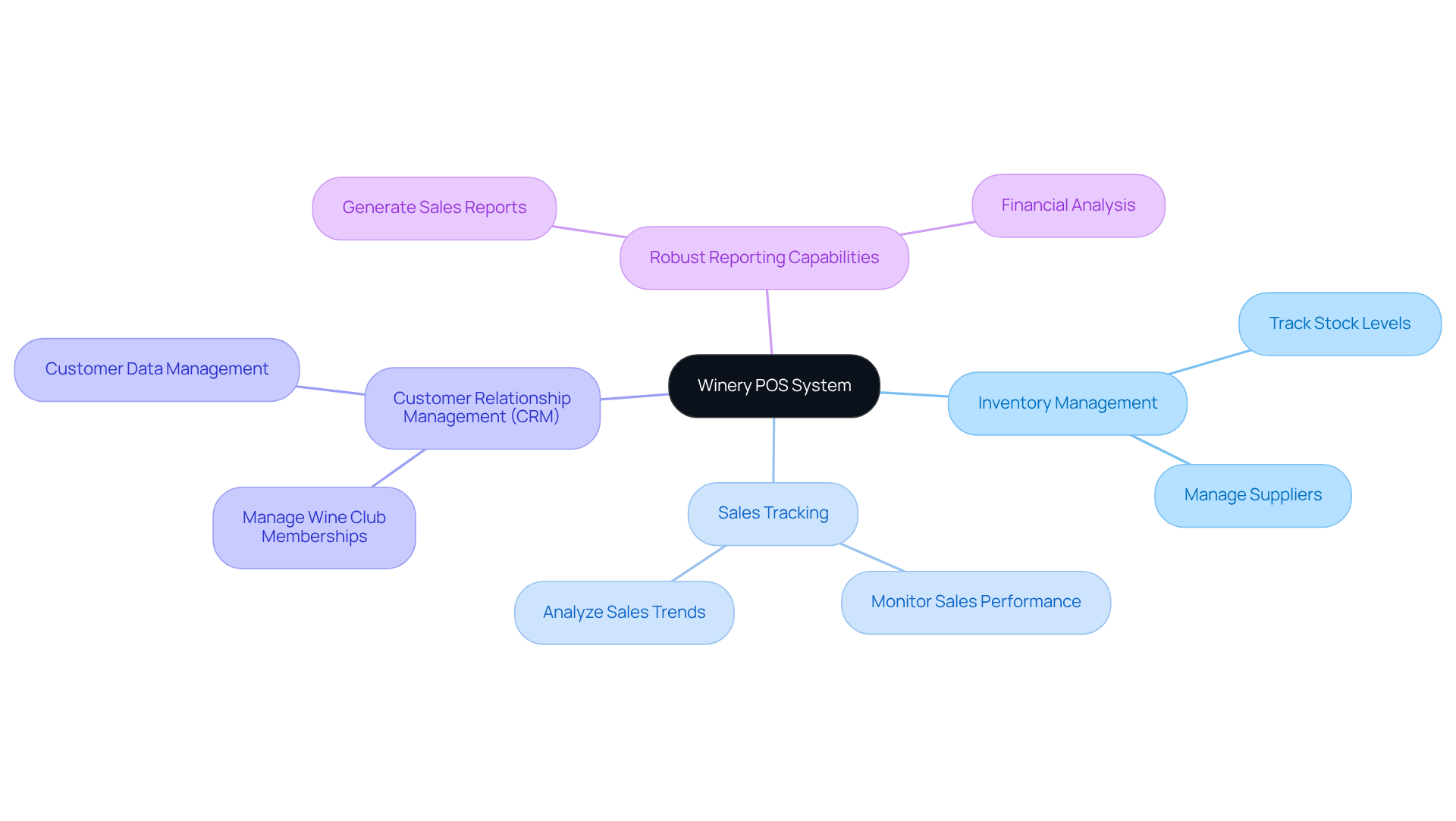
Contextualize the Importance of POS Systems in Winery Operations
In the competitive landscape of the wine industry, the effective management of sales and client interactions is paramount. The winery POS system serves as a vital instrument for vineyards, enabling them to monitor sales data, manage inventory, and enhance client engagement. As the industry shifts towards direct-to-consumer sales models, the integration of a robust POS solution becomes essential for maintaining operational efficiency and ensuring a seamless client experience. This is particularly critical for family-operated vineyards, which rely on cultivating strong relationships with their clientele to foster loyalty and stimulate repeat business.
The impact of POS systems on client engagement is profound. Establishments that utilize a winery POS system have reported enhanced order accuracy and expedited transaction times, directly improving the client experience. A notable case is Nickolls & Perks, which witnessed operational enhancements after transitioning to the Wine Hub platform. This shift resulted in quicker order creation and improved consistency in reporting. Such efficiency not only streamlines operations but also allows staff to focus more on client interactions, thereby fortifying relationships.
Furthermore, the ability to harness data from the winery POS system empowers vineyards to tailor their marketing strategies and optimize inventory management. With 71% of restaurant owners leveraging POS data to refine menu selections and , vineyards can similarly utilize this data to expand their product offerings and connect with patrons more effectively. The transition to a winery POS system, like Wine Hub, has proven to be transformative for numerous producers, enabling them to meet specific operational needs while enhancing client satisfaction. Additionally, integrating strategic capital planning with point-of-sale technologies can aid vineyards in achieving their financial objectives, fostering sustainable growth.
In conclusion, the adoption of advanced winery POS system technologies transcends mere sales enhancement; it is about cultivating a more engaging and personalized experience for clients. As vineyards navigate the complexities of the market, those that invest in an effective winery POS system, along with strategic capital planning and compelling storytelling, are likely to see a significant increase in customer loyalty and overall sales performance.
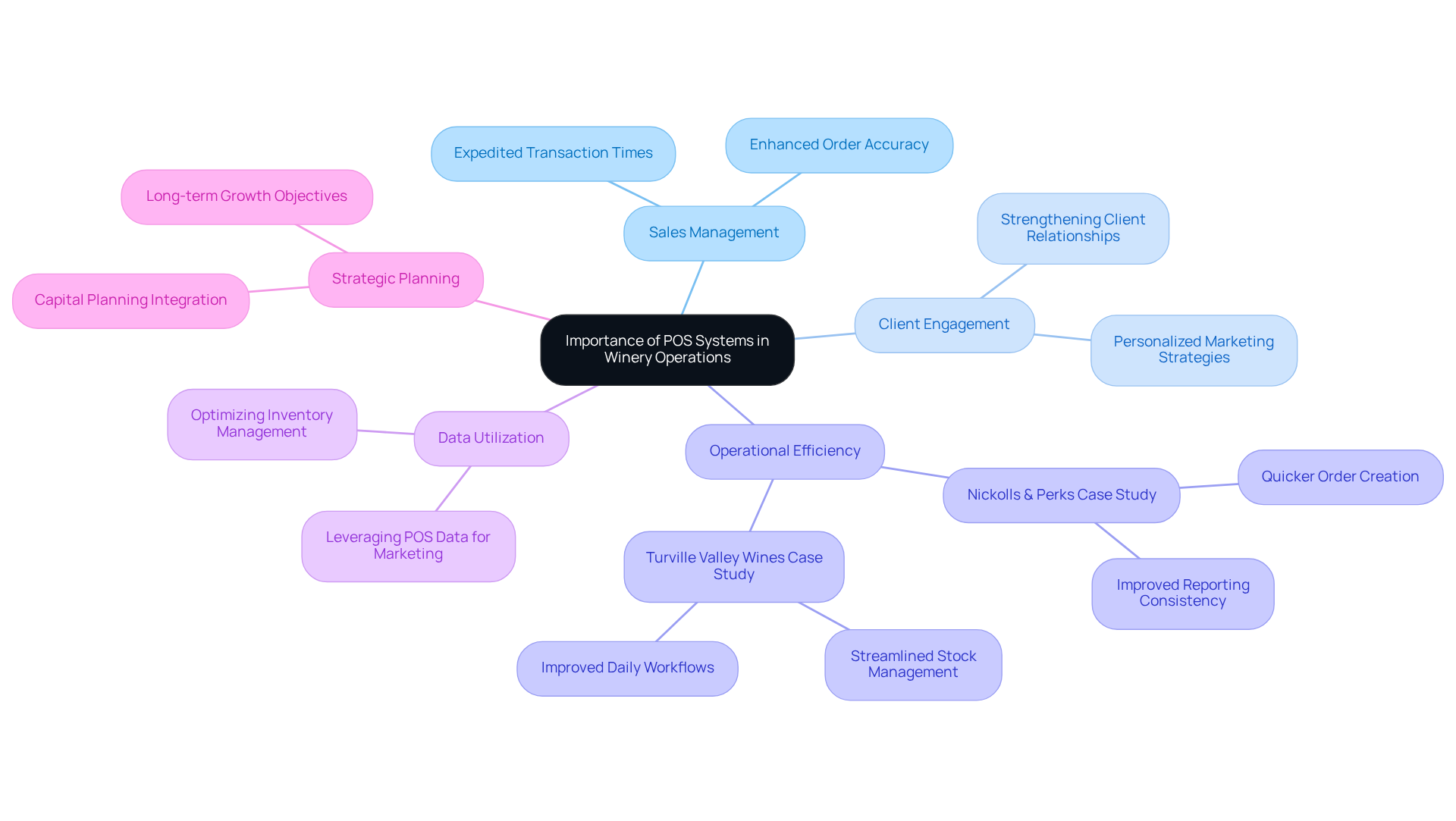
Trace the Evolution of POS Systems in the Wine Industry
The evolution of winery POS systems in the wine sector exemplifies the broader trends in technological advancement and highlights the growing importance of direct-to-consumer strategies. Initially, vineyards relied on manual cash registers and paper-based sales tracking methods. However, as the industry evolved and consumer expectations shifted, the necessity for more advanced solutions became clear.
Digital winery POS systems have revolutionized vineyard operations, facilitating real-time inventory management and sales analytics—key elements in transforming casual buyers into devoted club members. Moreover, innovations such as mobile payment processing and cloud-based systems have enhanced POS functionality, allowing businesses to swiftly respond to market dynamics and consumer preferences.
By harnessing these technologies, family-owned vineyards can execute targeted strategies, including:
- Personalized marketing campaigns
- Loyalty programs
- Strategic capital planning
These strategies aim to and cultivate loyalty in the competitive wine market.
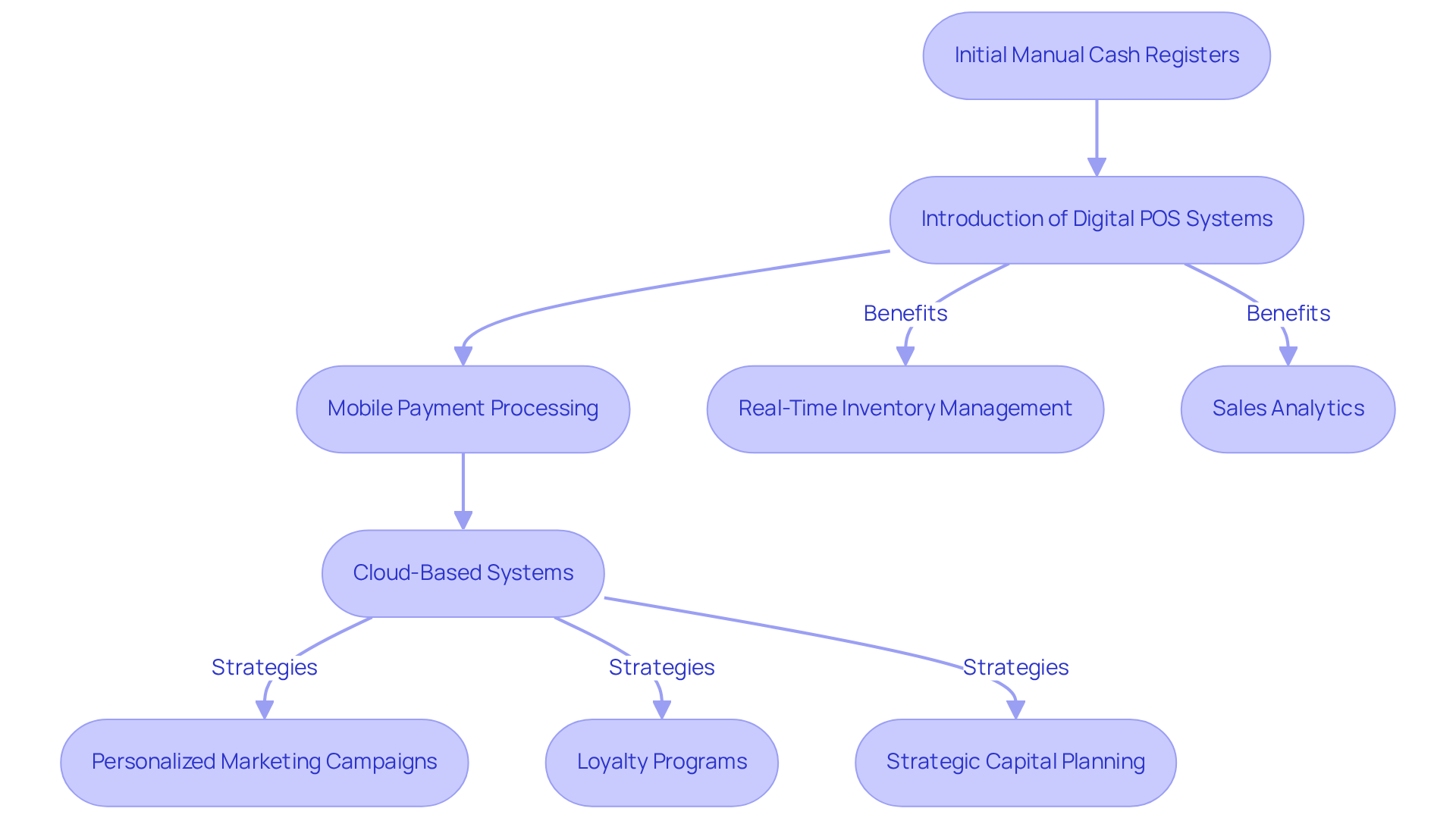
Highlight Benefits: Efficiency, Customer Engagement, and Sales Growth
Implementing a winery pos system offers significant advantages, including enhanced operational efficiency, improved consumer interaction, and notable sales growth, particularly in direct-to-consumer channels. For instance, vineyards can streamline their checkout processes with a winery pos system, thereby reducing wait times and boosting client satisfaction. As Champ noted, 'We invest a significant amount of time with clients when they initially receive the setup,' underscoring the importance of training in maximizing the setup's potential.
Moreover, the winery POS system empowers vineyards to gather crucial client data, enabling personalized marketing initiatives and targeted promotions that transform occasional buyers into loyal club members through strategies such as exclusive offers and tailored communications. This data-driven approach not only fosters client loyalty but also drives sales growth by optimizing inventory management and identifying trends in consumer behavior.
Activ8's DTC solution exemplifies this, eliminating the need for synchronization across multiple platforms, which saves time and resources for vineyards. Additionally, the platform's visually appealing interface and robust data security features further enhance operational efficiency and customer engagement.
As evidenced by Enocap's clients, vineyards that adopt an effective winery pos system frequently witness substantial improvements in their direct-to-consumer sales channels, with 27% of new wine club registrations originating from digital sources. This statistic highlights the and storytelling within the wine industry.
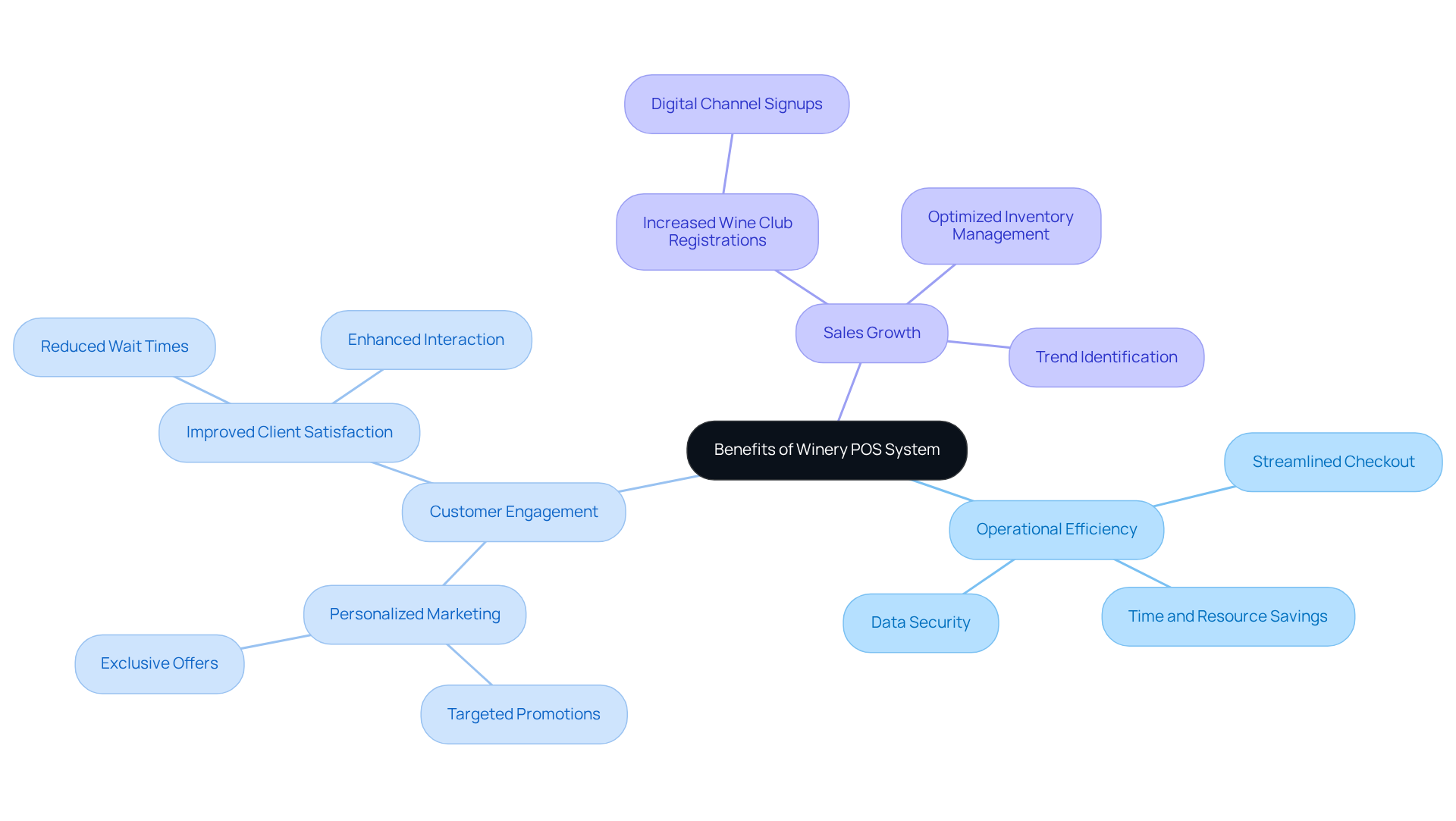
Explore Future Trends in Winery POS Systems
The evolution of the winery POS system is profoundly shaped by emerging technologies, particularly through enhanced integration with e-commerce platforms. This transformation allows vineyards to streamline operations and expand their market presence, as evidenced by the remarkable , which surged from 1.5 million to 4.1 million due to strategic initiatives.
Additionally, improved mobile features are becoming essential, enabling vineyards to facilitate seamless transactions and deliver personalized client experiences. The integration of artificial intelligence is revolutionizing data analysis within point-of-sale platforms, allowing businesses to leverage advanced analytics for superior inventory management and customer insights.
Moreover, the adoption of contactless payment options not only enhances transaction efficiency but also aligns with shifting consumer preferences for convenience and safety. By embracing these technological advancements and leveraging Enocap's strategic capital advisory services—including tailored debt, equity, and acquisition solutions—wineries can ensure their POS systems are agile in meeting current market demands and strategically positioned for sustainable growth through effective direct-to-consumer strategies.
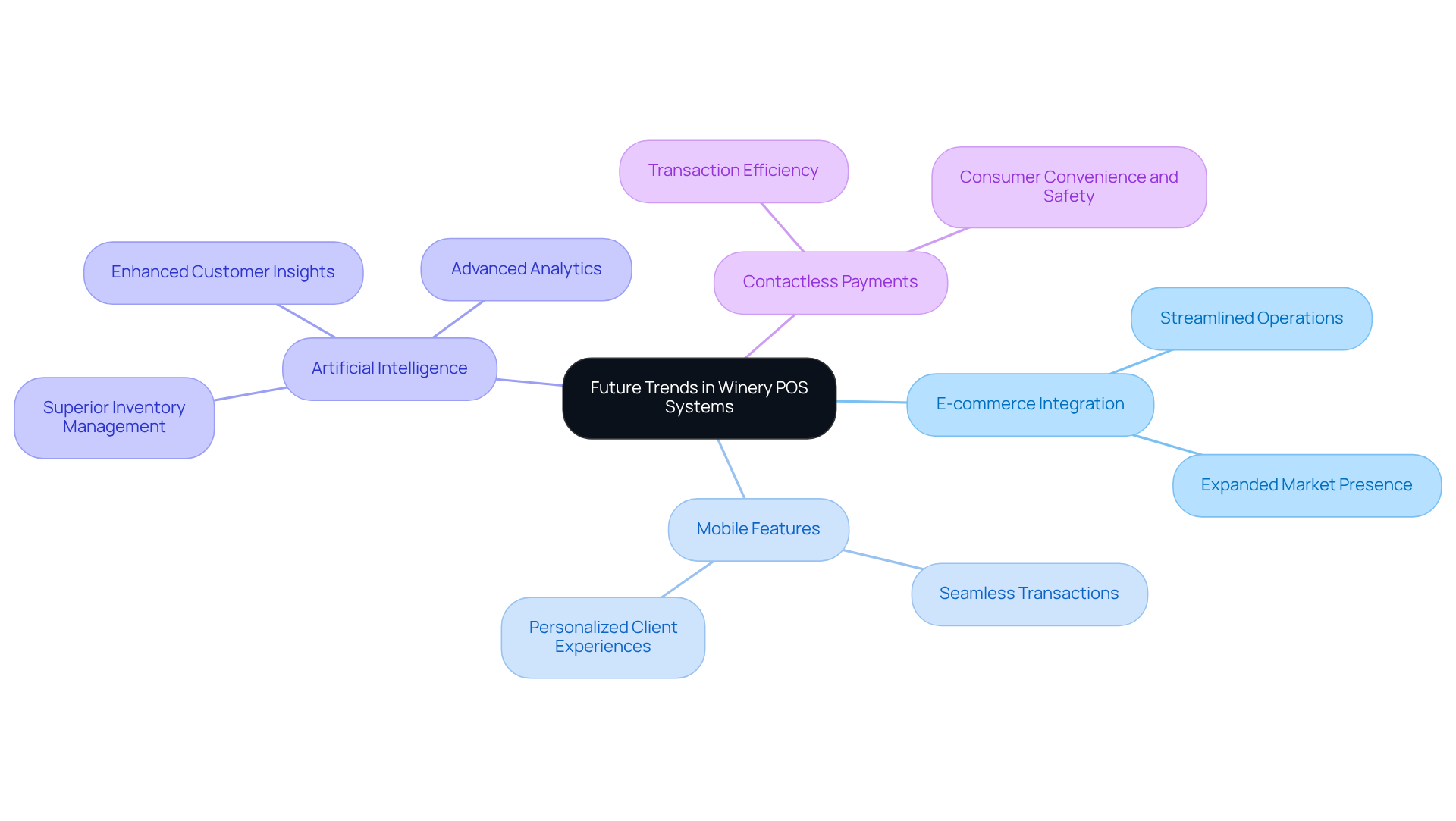
Conclusion
Investing in a winery POS system is not merely a choice; it is a pivotal decision for vineyards seeking to elevate operational efficiency and cultivate enduring customer relationships. These systems embody a remarkable technological evolution, meticulously designed to address the distinctive needs of wineries. They facilitate seamless transaction processing, enable effective inventory management, and support robust customer engagement strategies. By embracing such systems, vineyards can convert casual visitors into devoted club members, thereby fostering sustainable growth through enhanced direct-to-consumer channels.
The article underscores several key advantages of winery POS systems, including:
- Heightened efficiency in sales transactions
- Improved customer interactions
- Opportunities for data-driven marketing
The evolution of these systems mirrors the industry's transition towards direct-to-consumer sales, illustrating how contemporary technology empowers family-owned vineyards to flourish in a competitive landscape. Case studies from successful wineries exemplify the tangible enhancements in sales performance and customer loyalty achievable through the strategic implementation of these systems.
Ultimately, the relevance of a winery POS system transcends mere operational improvement; it is fundamentally about crafting a more personalized and engaging consumer experience. As the wine industry continues to evolve, it is imperative for vineyards to adopt these technological advancements to maintain competitiveness. By harnessing insights derived from data analytics and integrating innovative payment solutions, wineries can not only satisfy current market demands but also strategically position themselves for sustainable success and growth in an increasingly digital environment.
Frequently Asked Questions
What is a winery POS system?
A winery POS system is a specialized software and hardware solution designed for wineries to enhance direct-to-consumer sales strategies, streamline sales transactions, and optimize vineyard operations.
What are the key features of a winery POS system?
Key features of a winery POS system include inventory management, sales tracking, customer relationship management (CRM), and robust reporting capabilities.
How does a winery POS system improve operational efficiency?
By processing payments, managing wine club memberships, and generating insightful sales reports, a winery POS system helps vineyards operate more efficiently and turn casual buyers into loyal club members.
Why are POS systems important for winery operations?
POS systems are crucial for managing sales and client interactions, enabling vineyards to monitor sales data, manage inventory, and enhance client engagement, especially in a direct-to-consumer sales model.
How do winery POS systems impact client engagement?
They enhance order accuracy and expedite transaction times, leading to improved client experiences. For example, Nickolls & Perks saw operational enhancements after adopting the Wine Hub platform, resulting in quicker order creation and better reporting consistency.
How can data from a winery POS system be utilized?
Vineyards can use data from their POS system to tailor marketing strategies, optimize inventory management, and expand product offerings, similar to how restaurant owners leverage POS data for menu selections and digital engagement.
What benefits do family-operated vineyards gain from adopting a winery POS system?
Family-operated vineyards can cultivate strong client relationships, foster loyalty, stimulate repeat business, and achieve financial objectives through strategic capital planning integrated with their POS technologies.
What is the overall significance of investing in a winery POS system?
Investing in a winery POS system is essential for cultivating long-term success and consumer engagement, allowing vineyards to navigate market complexities and enhance customer loyalty and sales performance.




